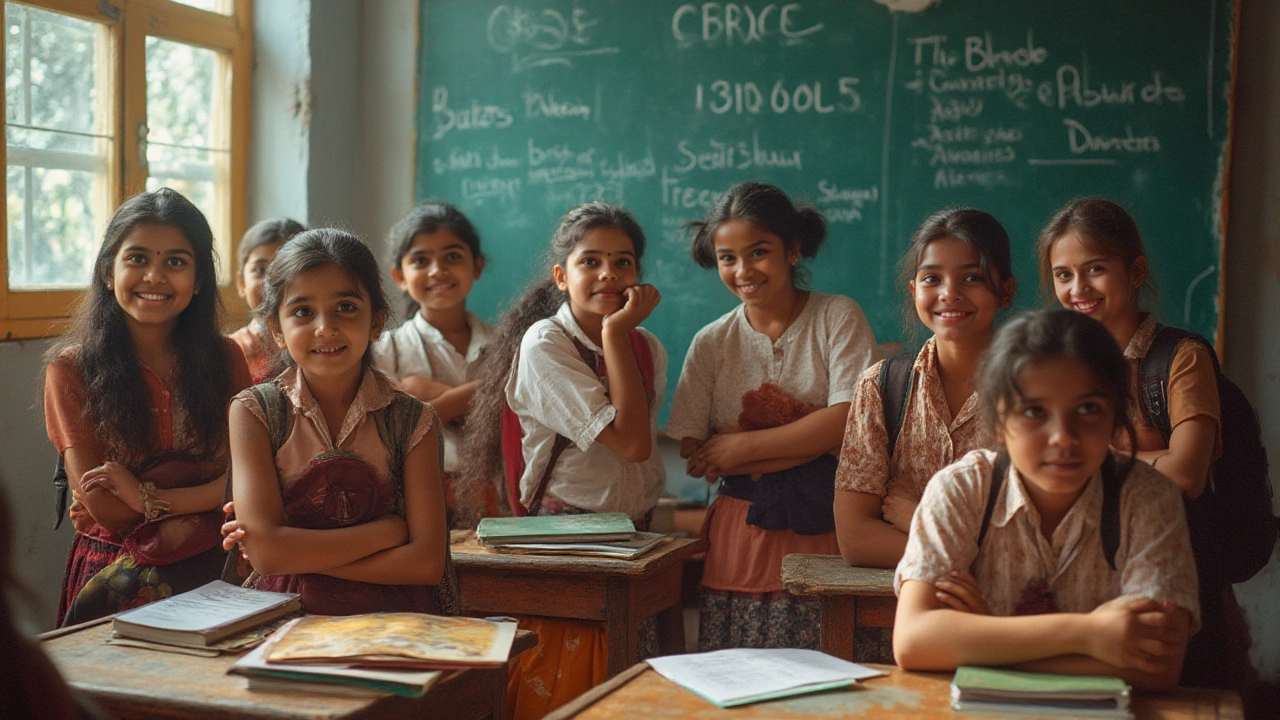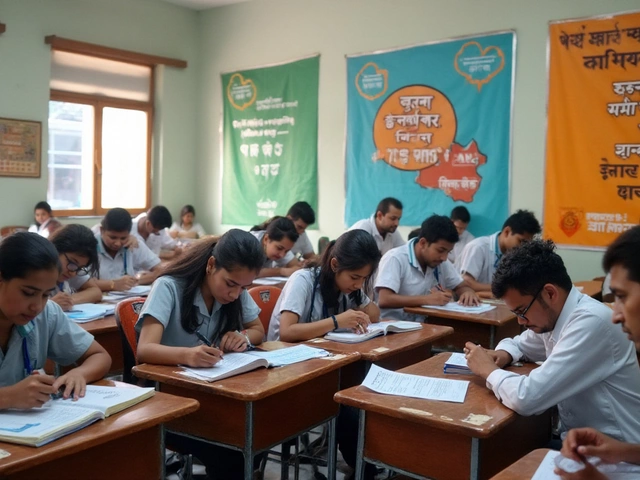
Which Is the Toughest Board in India? Comparing CBSE, ICSE, and State Boards
Nobody forgets the nail-biting pressure of Indian board exams. Parents arguing over syllabus, students memorizing textbooks till midnight, and relatives poking their noses into your marks—this isn’t just a stereotype, it’s real life for millions every year. Yet, when it comes to the big question—Which board is the toughest in India?—the answers are rarely as clear-cut as the textbooks themselves. The competition is fierce, the reputations are legendary, and myths float everywhere. But peel back the opinions, and you’ll find some jaw-dropping truths about what students actually face.
Understanding the Major Boards in India
India has a buffet of school boards, but three grab the most attention: Central Board of Secondary Education (CBSE), Indian Certificate of Secondary Education (ICSE), and the patchwork of State Boards running under each state government’s education department. These aren't just names on a school prospectus—they shape how millions of kids learn, what they cram, and even the stress levels in living rooms across the country.
CBSE is easily the most recognized board in India. Established in 1962, its headquarters sit pretty in Delhi, and more than 24,000 schools are affiliated to it. If you ask any Indian family, CBSE often feels like the default option, partly because it's favored for competitive exams like JEE (for engineering) and NEET (for medical).
On the other side, ICSE, the brainchild of the Council for the Indian School Certificate Examinations (CISCE), is all about those thick textbooks and a reputation for being 'elite' and demanding. The ICSE board plants its roots deep in English language and literature, but it doesn't skimp on science, math, or arts. ICSE schools invite over 2,500 institutions across India.
State Boards? In every state, the education department cooks up its own rules, exams, and syllabi. Maharashtra, Tamil Nadu, West Bengal, and Uttar Pradesh have millions of students under their watch. Their focus often matches the local language and culture, making education more accessible, but also wildly different in standards and rigor compared to the national boards.
| Board | Number of Schools | Languages Offered | Focus Area | Assessment Style |
|---|---|---|---|---|
| CBSE | 24,000+ | English, Hindi, Regional | Science, Math, Competitive Exams | Objective & Subjective, centralized |
| ICSE | 2,500+ | English, Hindi | English, Arts, Diverse Academics | Mostly subjective, assignments & projects |
| State Boards | Thousands in each state | Local language, English, Hindi | Regional relevance | Mostly subjective, local variation |
So, why do people obsess over which board is the toughest? Because your board can determine how you think, write, and even which university doors open for you. This is about more than classes and exams; it trickles into careers and confidence for life.
CBSE: The Rigor and Reality
CBSE has a massive presence. If you’ve seen engineering or medical hopefuls clutching their science books, that’s probably because CBSE’s syllabus lines up perfectly with JEE and NEET. The board claims to balance theory and practical learning, but let’s not sugar-coat it: rote learning still rules the day. And yet, is it as tough as people say?
First off, CBSE is big on standardization. The textbooks (mostly NCERT) are nationally recognized. This keeps things fair, but it also means little room for creative answers. The marking is strict but predictable. If you know how to present your answers, you can score high—sometimes, too high. Everyone knows the meme-worthy stories of students scoring 99 percent in every subject.
But that high average comes with a side-effect: relentless competition. The toppers set impossible benchmarks. CBSE’s exams focus a lot on science and mathematics, so a student who loves literature or arts might feel left out. Some critics also point out that students get so used to the exam patterns, they end up ‘preparing for the exam’ rather than understanding the subject. There’s little space for out-of-the box answers.
If you’re aiming for IITs or AIIMS, CBSE might feel like home turf—the syllabus overlaps almost perfectly. For everyone else, CBSE can sometimes feel like a treadmill you can’t get off. The volume isn’t crushing, but the competition definitely is.
"CBSE is designed with competitive exams in mind, so students don’t have to relearn everything once they sit those tests," says Dr. Shikha Sharma, Education Analyst at India Today.
Here’s a tip: if you want to survive (or thrive), focus on mastering NCERT textbooks instead of ten different reference books. Most teachers confirm that over 80% of CBSE’s exam questions directly reference NCERT material.
ICSE: The Pressure Cooker of English and Beyond
The ICSE board has a bit of a cult status among Indian parents chasing a well-rounded education. Its curriculum is deep, broad, and famous for the way it dives into details, especially English. ICSE isn't just a science and math grind; there’s a serious focus on languages, humanities, and applied projects. But that reputation comes with certain baggage.
The workload in ICSE can feel overwhelming. Students as young as Class 8 talk about reading four different novels a year just for English coursework, all while also memorizing historical dates and tackling advanced math. The exams don’t hand out marks freely—answers are marked for content, clarity, and language. You can’t just copy and paste information. You have to explain and analyze, not just remember stuff. Some students (and their parents) love this depth, but for others, it can be a minefield.
Where ICSE stings is its project work. Every major subject, from environmental science to literature, comes with assignments. Students have sleepless nights balancing regular homework and those hefty projects. The grading is strict on plagiarism, originality, and presentation, which actually mirrors what universities expect worldwide. For those aiming to study abroad, ICSE’s English-heavy, project-based syllabus is a serious advantage.
But if you struggle with English, this board can feel brutal. Exams expect you to write—and write well. Memorization will only get you so far. It asks for essays, critical thinking, and neat presentation. This is why, despite the lower number of schools, ICSE alumni often stand out at debates and creative writing contests. However, if you’re targeting Indian national-level engineering or medical exams, ICSE's focus can feel a little off-target. The phrase “ICSE wala hai, toh English zabardast hoga” (If they’re from ICSE, their English will be ace) isn’t just an empty boast.
What rarely gets talked about is the pressure: burnout, anxiety, and at times an inferiority complex if you aren't naturally gifted at language or arts. ICSE doesn’t go easy at the top either. Getting above 95% in ICSE is a badge of honor for a reason—it happens, but it's far rarer than with CBSE.

State Boards: Wild Cards with Local Flavor
State Boards throw predictability out of the window. Their curriculum and difficulty range hugely across regions. For many, State Boards are more accessible, especially if English isn’t spoken at home. The syllabus usually links closely to regional history, culture, and language, which makes learning more relatable and less intimidating.
That said, the downside can be glaring. In some states—like West Bengal and Tamil Nadu—the curriculum runs deep and hard, with plenty of theory and detailed exams. Students tell tales of marathon question papers demanding long, essay-type answers. Yet in other states, the academic rigor can drop, with a focus on scoring rather than actual critical thinking. In places like Bihar or UP, there's constant debate about paper leaks, unfair marking, or syllabus mismatches with national-level entrance exams.
That doesn’t mean State Board students have it easy. Far from it. Many juggle with fewer school resources, larger class sizes, and out-of-date textbooks. Yet, some state syllabuses—like Tamil Nadu’s—are infamous for their intense theoretical grind, with students complaining about memorizing gigantic swathes of material, especially in science subjects.
What State Boards really offer is access. They keep education alive in the local language and at a lower cost than the big private CBSE or ICSE schools. If your aim is state-level universities or government jobs, sometimes a strong State Board result is all you need. But if you’re aiming for a national exam or a specialized field, the jump from State Board to those tough all-India tests can feel like hitting a wall.
Here’s a tip: Don’t just look at the board’s brand—check the track record of your specific school. The quality swings wildly depending on teachers, facilities, and student support. Not every State Board institution offers the same support system.
Exam Formats, Scoring Trends, and Hidden Challenges
The real test, and where boards differ most, is in the structure and demands of their exams. The CBSE format is known for objective-type questions, with clear right-or-wrong answers, and a marking system that rewards clarity and brevity. ICSE prefers long-form answers, open-ended questions, and expects better articulation and explanation. Meanwhile, each State Board does its own thing, with little effort toward making exams robustly objective or standardized.
Let’s look at the numbers. Average pass rates tell some stories. CBSE’s pass percentage for Class 10 and 12 exams in recent years has hovered around 93%. ICSE’s Class 10 rates often climb above 99%, but fewer students take ICSE overall. With State Boards, it’s all over the map—from as low as 60% in some states, to above 90% in others, depending on the year, the teachers, and the government’s mood toward grading leniency. It’s worth looking at this quick table to see recent pass percentages:
| Board | 2023 Pass % (Class 10) | 2023 Pass % (Class 12) |
|---|---|---|
| CBSE | 93.12 | 87.33 |
| ICSE | 99.98 | 96.93 |
| TN State Board | 91.39 | 94.03 |
| WB State Board | 86.76 | 89.25 |
What’s hidden under these numbers is a mountain of struggle. Markers in State Boards sometimes push averages up to avoid mass failures, while ICSE sticks to tough grading. CBSE’s results depend heavily on school quality and how well students have cracked the exam pattern. In all boards, urban students score higher on average than rural students, mostly because of access to coaching centers, better schools, and supportive environments.
If you’re picking a board for your child or wondering which is hardest, don’t just chase the pass rates. Look at exam patterns, the kind of questions asked, and whether the board prepares you for the kind of future you want—science, arts, business, or something else entirely.
Breaking Down the Myths and Giving the Real Answers
If you believe the rumors, ICSE is for “brainy kids,” CBSE is for “science toppers,” and State Boards are the “easy way out.” That’s wide of the mark. Here’s what really matters—the toughest board is the one that matches up poorly with your natural inclinations and your future goals. If you’re a math and science fanatic, CBSE’s logical focus may feel like a breeze, while ICSE’s heavy essays feel like a death march. If you shine in languages and critical thinking, ICSE lets you break out of rote learning and show what you know. But if your future is tied to your local community, government job, or state university system, the State Board can be your best bet, even if you have to work twice as hard for recognition beyond your region.
Want some tips that actually work?
- For CBSE, drill NCERT textbooks and practice old question papers—the exam pattern barely shifts from year to year.
- For ICSE, focus on writing skills and understanding concepts. Don’t skip projects or assignments—marks are hidden there.
- If you’re with a State Board, keep your eyes open for announcements about syllabus or marking changes—they can come out of nowhere.
- Above all, ignore the snobbery. Thousands crack entrance exams from State Boards every year, just as ICSE and CBSE kids win Olympiads and scholarships abroad.
One thing is certain: what’s hardest isn’t always what’s best. Instead of chasing the toughest board, chase the one that makes you curious, not just anxious. Because in the end, the world outside school doesn’t care how much you scored in Class 12 English, but it will care how you think, adapt, and learn for the rest of your life.






Write a comment